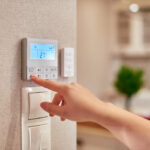It’s firmly fall season in Utah, and as longtime residents well know, that means things could give way to winter at any moment. If you’re like many other homeowners in the area, you’re spending at least a bit of time this season thinking about your home’s heating capabilities and efficiency ahead of the coldest part of the calendar.
At Action Plumbing, Heating, Air & Electric, we offer numerous heating services to all our clients, from basic seasonal furnace tune-ups to furnace replacement, boilers, ductless heating systems and more. On top of our yearly services, what are some of the main tips we offer clients on how to improve their home’s heating efficiency? This two-part blog series will go over several options.
Upgrading Your Thermostat
The thermostat is the brain behind the entire heating and cooling operation, and it often has a larger impact on efficiency than you might think. It communicates with your various HVAC systems to allow for proper heating or cooling depending on the need.
If you have an older thermostat, multiple issues could be at play. For one, older units are simply more prone to malfunction. For another, older manual thermostats require you personally adjust them every time you want to change the temperature – this sort of thing is far less efficient than a programmable or smart thermostat, which you can upgrade to and save huge sums on your energy bill while staying just as comfortable as before, if not more so.
Sealing Space
A major cause of heating inefficiency in homes: Air loss, which takes place due to air escaping from unsealed locations. Look around your doors, windows and any other entryways for cracks or gaps, then utilize products like caulk or weatherstripping to seal off these areas. You might be shocked at how much you save on your monthly bill just by sealing a tiny crack or hole.
Insulation Themes
There are several distinct home areas to consider insulation for when it comes to heating efficiency:
- Attic: In many homes, air loss comes primarily from lack of attic or roof insulation that allows hot air to rise and escape. Ensure your attic has proper ventilation and all ceiling penetrations are sealed.
- Window treatments: Some windows also contribute heavily to heat loss, but insulation like blinds or drapes will limit this effect significantly.
- Hot water pipes: Save significant energy costs by insulating your hot water heater and pipes leading from it, which will cause the system to work more efficiently and provide hot water faster.
Fall Maintenance
One of the single most important ways you can prevent heat loss or heating inefficiency is by counting on HVAC professionals. Our pros will inspect and tune up your entire system, ensuring it’s operating efficiently and remedying any minor concerns that might be limiting operation.
For more on how to increase heating efficiency in your home, or to learn about any of our HVAC or plumbing services, speak to the staff at Action Plumbing, Heating, Air & Electric today.


